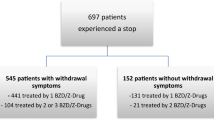Abstract.
Rationale: Benzodiazepines have dependency-producing properties, and the majority of patients who are prescribed benzodiazepines and are treated for benzodiazepine dependency are women. Inability to cope with withdrawal symptoms may lead to continued consumption of benzodiazepines, often with the development of tolerance and dose escalation as a consequence. Objective: In the present study we analyzed gender-related differences in reactions to placebo injections in a placebo-controlled study of the effects of the benzodiazepine antagonist flumazenil among patients previously treated for benzodiazepine dependency and healthy controls. Methods: Ten patients and ten controls (five males and five females in each group) received two placebo injections (separated by 15 min) on two separate occasions (1–13 weeks apart). The patients had been benzodiazepine free for 47 (4–266) weeks on the first occasion. Subjective ratings of symptoms, thought to be important during/after withdrawal of benzodiazepines, were made before and after each injection, as well as registrations of blood pressure and heart rate. Results: An overall difference existed between previously benzodiazepine-dependent subjects and healthy controls, with patients scoring higher on negative and somatic aggregates and lower on a positive aggregate. A four-way interaction (group×gender×occasion×time) was found for negative and somatic aggregates, which could mainly be explained by the reactions of female patients. Thus, females had the highest base-line ratings and were the only group that showed a significant reduction in symptom ratings after placebo injections on the first occasion. Gender differences were also found for systolic and diastolic blood pressure. There was no significant response to placebo among male patients or for controls (males or females) for ratings of any variable. Conclusions: The results suggest that there might be gender-specific differences in reactions to placebo injections, with female patients being more affected. Arguments for and against explanatory factors such as expectation, provider factors, habituation, regression toward the mean, and reduction of anxiety are presented.
Similar content being viewed by others
Author information
Authors and Affiliations
Additional information
Electronic Publication
Rights and permissions
About this article
Cite this article
Saxon, L., Hiltunen, A., Hjemdahl, P. et al. Gender-related differences in response to placebo in benzodiazepine withdrawal: a single-blind pilot study. Psychopharmacology 153, 231–237 (2001). https://doi.org/10.1007/s002130000574
Received:
Accepted:
Issue Date:
DOI: https://doi.org/10.1007/s002130000574




